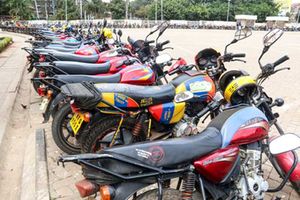
Treasury CS Njuguna Ndung’u.
The Treasury is set to introduce VAT on bread and increase excise taxes on M-Pesa, airtime and bank transfers, spirits and cigarettes as it seeks to raise an additional Sh323 billion in taxes in the financial year that starts in July.
Apart from bread, President William Ruto's administration avoided imposing new payroll taxes and on essential items like food to avoid angering some individuals and groups who last year challenged the tax measures such as the Housing Levy in court.
Households, however, will pay 16 percent value added tax (VAT) on bread in a move that will see the cost increase by at least Sh10 for a 400 grams loaf, says the newly published Finance Bill.
The cost of mobile money transfer like M-Pesa, airtime and data is set to increase in the wake of proposals to impose additional tax on the items.
The 2024 Finance Bill is also introducing a new motor vehicle circulation tax that will see motorists cough up to Sh100,000 annually to keep their vehicles on the road.
The Bill proposes to raise the taxes levied on motorcycle imports, betting, payment from government supplies or tenders and whiskies.
Overall, the government is targetting tax collections worth Sh2.94 trillion in the next fiscal year, up from Sh2.62 trillion in the current year.
The Kenya Revenue Authority (KRA) has however been lagging behind the target, having collected Sh1.587 trillion in taxes and non-tax revenue in the nine months to March 2024, against a prorated target of Sh1.932 trillion.
Bread, which is currently on a list of items that are zero rated for VAT purposes— including flour, milk and sanitary products— will attract the 16 percent tax that will see the commodity increase by at least Sh10 for 400 gram loaf.
National Treasury Cabinet Njuguna Ndung’u said in March that the breakfast staple was likely to be levied VAT, arguing that its zero rating was misplaced since it benefits the middle class who shop in supermarkets rather than the targeted low income households.
The annual motor vehicle circulation tax that was proposed in the medium term revenue strategy for 2024-2027 is also being implemented.
The Finance Bill 2024 proposes the introduction of a 2.5 percent annual tax on the value of vehicles, with the deduction set at a minimum of Sh5,000 and a maximum of Sh100,000.
The deduction, called motor vehicle tax, will be paid on each car at the time of issuing an insurance cover.
This means second hand cars like Toyota Harrier and Mercedes Benz C-Class that were in February averaging between Sh4 million and Sh4.4 million in many yards in Nairobi will attract the maximum tax of Sh100,000, with the value only falling if valuation declines in subsequent years.

Heavy traffic jam along University Way in Nairobi.
The Treasury is also proposing to introduce a controversial environmental levy on wide-range of goods like mobile phones, TV and batteries, with the charge ranging from Sh98 per item to Sh1, 275.
Dr Ruto has emerged as a key voice of Africa’s climate ambitions, with his push to catalyse the continent’s climate goals making him a darling of the West.
For motorcycle imports, the proposing a two-tier excise system, which will see those buying units either pay a flat fee of Sh12,952 or 10 percent of the value of the motorcycle, whichever is higher.
This means that any import costing more than Sh130,000 will automatically attract higher excise compared to the present rate of Sh12,952 per unit.
Sin tax
The Finance Bill also marks a return to the ritual of increasing sin taxes on items such as alcoholic beverages, confectionery and cigarettes, which had enjoyed a reprieve last year after manufacturers complained that higher taxes risked triggering lower revenue performance and a rise in illicit trade.
In the current fiscal year, the State’s target from excise duties stands at Sh350 billion, which is expected to go up to Sh400 billion in the 2024/2025 fiscal year.
Apart from cutting spending and reducing the budget deficit, Ruto's government, which took office in 2022, has also been introducing new taxes, angering some individuals and groups who have challenged the tax measures in court.
Dr Ruto campaigned on a platform of reducing the cost of living.
While seeking election, he accused former President Uhuru Kenyatta of letting food costs “skyrocket because he has never slept without food in his life, as he was born in a wealthy family."
The Bill proposes a new method of calculating excise on beer, wine and spirits based on pure alcohol content—also known as alcohol by volume (ABV)— unlike the present method which has a flat excise for each of the three types of alcoholic drinks.
Beers of alcohol content of below six percent and wine will be levied excise at Sh22.50 per decilitre (10ml) of pure alcohol, while spirits will be levied Sh16 per decilitre of alcohol content.
For wines, which normally have about 12 percent ABV, the excise per litre will go up to Sh270 from the current Sh243.43.

Beer consumers are set for a tax reprieve as the government moves to lower the excise levied on the product while slapping higher sin taxes on spirits, wine and cigarettes.
Spirits, which presently attract excise at Sh356.42 per litre, have an ABV of between 37 percent and 45 percent for most brands. At the lower end, the excise duty per litre will jump to Sh592 per litre, while for those with an ABV of 45 percent, the excise will jump to Sh720 per litre.
The spirits are commonly sold in 750ml bottles, which will now attract excise of between Sh444 and Sh540 per bottle based on the ABV.
Beers that have an ABV of 4.2 percent, such as Tusker and White Cap, will however see their excise fall to Sh94.50 per litre from Sh142.44 under ABV-based method of calculation. This will effectively cut the tax on a half litre bottle in which they are sold to Sh47.25 from the current Sh71.22.
Stout beers such as Guinness and Senator Dark Keg, which have ABVs of 6.5 percent and percent and 7.5 percent respectively, are however expected to attract slightly higher excise of Sh73.13 and Sh84.37 respectively per half litre bottle.
For cigarettes, the Treasury is proposing to increase duty on unfiltered cigarettes, which are commonly used by lower income smokers, from Sh2,926.41 per mille (1,000 sticks) or Sh2.96 per cigarette stick to Sh4,100 per mille, or Sh4.10 per cigarette.
On filtered cigarettes, the excise per mille has been raised to Sh4,100 from Sh4,067.03 previously, translating to an excise increase from Sh4.07 per cigarette to Sh4.10.
Excise on betting and gaming stakes is being increased for a second straight year, going up to 20 percent from 12.5 percent in 2023, and 7.5 percent in 2022.
The Bill wants to raise the excise on mobile money transfer fees, and cash transfers in banks, money transfer agencies and other financial service providers like Saccos to 20 percent, from 15 percent, setting the stage for costly M-Pesa.

Mobile user using the Mpesa application.
The excise on mobile airtime and data charges has also been raised to 20 percent from 15 percent in the new Finance Bill.
The proposals effectively reverse the cuts that had been made on money transfer charges in the 2023 Finance Act, a move that was meant to cushion Kenyans from higher costs of transacting cash in a tough economic climate.
Other proposals include a tax of five percent on payment from government supplies, targeting those who do business with the government.
Kenyans earning from a digital marketplace including taxi hailing and food delivery will also start paying a digital service tax of 1.5 percent, while foreigners like Amazon, Alibaba and Netflix selling goods and services on a digital platform, but lack a physical presence in Kenya, will pay a tax known as Economic Significant Presence Tax, which will be calculated at 20 percent of their gross turnover.
The Bill is also targeting public officers who will now be required to pay tax on reimbursements they receive for performing official duties. The tax exemption of per diems has also been capped at an equivalent of five percent of employee’s gross monthly income, from the current Sh2,000 per day.
Pension levies
For the pension sector, the Bill proposes to raise the tax-free pension contribution for employees to Sh360,000 a year (Sh30,000 a month) from Sh240,000 in a year (Sh20,000 a month). The move is designed to encourage higher pension savings by workers in the country.
The Finance Bill also proposes that employees who have saved for at least 20 years will access their pension payments tax-free. Currently, only those who have attained the retirement age enjoy this relief.












